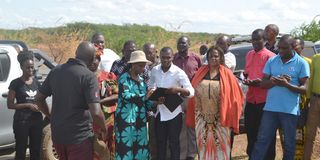Why Tana locals are leasing farms to investors as they become labourers

Farmers watch the demonstration on the use of machines in Rice Planting at the Bura Irrigation Scheme.
For the past two years, investors have kept flocking to irrigation schemes in Tana River County, where locals are leasing farms to become labourers.
The farms that were once idle are now booming with activities, to the amazement of the locals.
Rice farmers from the Mwea Irrigation Scheme and others from overseas, onion and cowpea growers from Somalia, green grams planters from all over Kenya and ground nuts farmers from various Non Governmental Organisations are breathing back life into the irrigation schemes.
Maristella Bahati travelled from Kwale with a team of investors representing farmers across the coastal region on a fact-finding mission at the Hola and Bura irrigation schemes.
"We have read in papers and watched on TV how investors from Mwea are coming to invest here, and being small-scale farmers from other counties, we are here to find out the secret," she said.
The group, under the Pwani Ufanisi Farmers Cooperative (Pufco), comprises farmers from Kwale, Taita Taveta, Lamu, Kilifi, and Mombasa.
Ms Bahati said their curiosity was inspired by food scarcity and rising prices of commodities in the country and the opportunity they present to agribusiness.
The team comprises experts in market analysis, soil testing and production and an engineer. They are on a mission to invest in the irrigation schemes in Tana River County.
"Where we have come from there isn't enough land for commercial farming, but we were informed that there are opportunities here," she said.
She also said that apart from available land for farming, their research had revealed that irrigation schemes in the county are cheaper and there is a produce market.
"Most of the products sold in Mombasa and Kilifi happen to come from here, but in small amounts compared to the demand," she noted.
The group of 500 members is seeking more than 2,500 acres in the Bura and Hola irrigation schemes for farming of various crops.
Sudden increase in demand
In their view, the schemes have plenty of water and a ready market for products.
Pufco is not the only investor seeking land to farm in Tana River County.
Hola Irrigation Scheme Manager James Kirimi said more than 600 investors have ventured into the scheme, increasing the acreage of production from 300 to 1,800.
"The demand is increasing. Some of the investors coming to seek [opportunities in] farming are foreign organisations," he said.

Members of the Pwani Ufanisi Farmers Co-operative consult with the Bura Irrigation Scheme officers during their tour to the irrigation schemes across Tana River County.
Mr Kirimi noted that the sudden increase in demand from investors is due to the availability of land and reliable irrigation water.
Another factor is a favourable market for rice crops, with a ready market adding to the increased demand.
"Three months ago, a kilogram of the Komboka variety of rice was selling at Sh43 and now it sells for Sh71 and the finished product sells at Sh130 per kilogram," he noted.
In Bura, more than 800 investors have pitched camp, increasing the acreage of farming by more than 1,500.
They include investors from neighbouring countries who are investigating onions and cowpeas, as well as migrant Mwea farmers who have made local farmers shift from maize to rice farming.
Local farmers, on the other hand, suffer from a cash crunch that has prevented them from farming and are leasing farms to potential investors at low costs in exchange for becoming farm labourers.
Nathan Hiribae, once a farmer at the Hola Irrigation Scheme, has leased three acres of his farm to an investor.
"I got indebted after investing and my farm failed me. What I got in return was so little that I lost hope and spent the capital as well," he said.
Work as labourers
Mr Hiribae and his family now work as labourers for the investor. He did not reveal how much he was paid for the lease but he earns Sh500 per acre for work done on the rice farm.
"My work here is to open the dykes, ensure water on the farm is under control, and close the dykes to prevent erosion," he said.
He is not the only one labouring on a farm that was once his source of income. Dozens of others are too embarrassed to speak about it.
At the Bura scheme, more investors continue to flock to the farm for space to farm.
Also read: Hunger stalks Coast as drought bites
More than 200 farmers on the 12,000-acre farm have been working as labourers for investors for almost a decade.
They claimed the Agricultural Finance Corporation still holds them hostage for debts they took years ago.
"Some of us have debts of more than Sh80,000, so we can’t farm, some have more than Sh1 million to pay, which will take years, and they have to find other sources of income, feed, save and find a way to bounce back to agribusiness," said farmer Elias Makau.
With investors flowing in from various parts of the country to the Bura scheme, one thing remains certain – the farms are on their path to regaining their lost glory.
Bura scheme Manager Peter Orua said more land lies bare and more investors can take it over and increase production on the farm.





